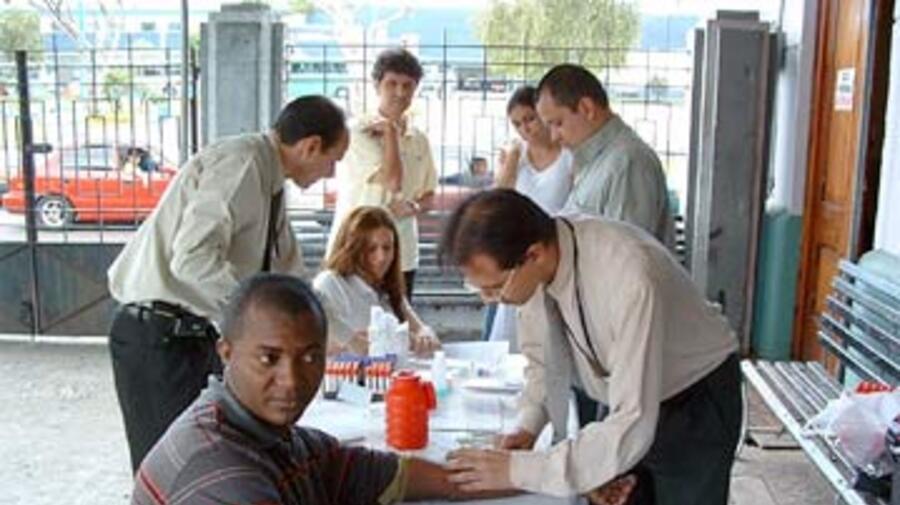Health Fair in Costa Rica gives refugees much needed medical care
Health Fair in Costa Rica gives refugees much needed medical care

Colombian refugees receiving free medical checks at Costa Rica's third annual Health Fair.
SAN JOSÉ, Costa Rica, March 6 (UNHCR) - Since the early hours of the morning, the old Pacific train station in the heart of the Costa Rican capital has been a makeshift medical centre. Mobile clinics have been set up inside tents erected in the great hall and mini-buses and vans parked along the rails. The atmosphere is festive, yet for thousands of refugees - and Costa Ricans too - the annual Health Fair is a very important occasion, as it is the only time in the year when they can get free medical tests and consultations.
Access to health care is one of the most important challenges facing refugees trying to settle in a new country. Ever since the 1980s, when Costa Rica was home to thousands of refugees who had fled the conflicts in Central America, UNHCR has been working with the national authorities to help improve refugees' access to health care. As a result, refugees and asylum seekers are entitled to free health care cover during their first three months in Costa Rica. They also get support with the administrative procedures needed to register with the state social security system afterwards. Economic difficulties or lack of information, however, often prevent refugees from taking advantage of benefits they are entitled to.
"In Costa Rica, access to social security services is universal, which means that everyone, regardless of nationality, is entitled to health coverage at a very low cost," explains Gloria Maklouf Weiss, Director of ACAI (Asociación de Consultores y Asesores Internacionales), one of UNHCR's implementing partners in Costa Rica. "However, some refugees are in such economic hardship that they cannot pay even the very small monthly fees."
In order to reach out to these refugees who have no health coverage at all, UNHCR and ACAI organised their first Health Fair in 2003. It was such a success that the Fair has now become an annual event, helping both refugees and Costa Ricans in dire need of medical attention.
Rafael comes from the Colombian capital, Bogota. He and his wife have been refugees in Costa Rica for the past five years. He got free social security for the first three months of his stay but has not had health coverage since then because he cannot pay the $20 monthly fee.
"Because I have had difficulties finding a job here, I've been working as a salesman and unfortunately I cannot afford the social security fees," he says, waiting outside one of the mobile clinics at the Fair. "A month and a half ago I suspected I had Dengue fever, I had a high fever for several days and pain all over my body. But, I had to look after myself alone at home because I had no money to pay for a private doctor and I felt ashamed of going to the public hospitals."
At the Fair, refugees like Rafael can see doctors, both generalists and specialists, as well as nurses. They are offered a variety of medical checks and services such as eye and blood tests, dentistry, electrocardiograms, cytology and audiometric tests, as well as general medical consultations.
Dr. Guadalupe Miranda is one of the medical consultants offering their services at the Health Fair. Having worked all her life in the public health domain, she says she is happy to be able to help the refugee community.
"I feel very close to the refugee population," she says. "I started working with them during the Central American refugee crisis in the 1980s. At the time I was the medical director of the Tilarán refugee camp, very close to the border with Nicaragua. I was also in charge of coordinating medical care in the other five refugee settlements that Costa Rica had at that time," she recalls with pride.
The situation has changed a lot since then. Refugees coming into Costa Rica today tend no longer to be from Central America but instead the vast majority are from Colombia. Many are middle-class, urban professionals.
"While in the 1980s we had to work with refugees that were already sick when they arrived, today we work more on prevention," Dr Miranda says, adding that she finds working with Colombian refugees very rewarding. "They are very nice, very cooperative people who have come to give a lot to this country."
Andrea comes from the Colombian city of Medellín and has been a refugee in Costa Rica for six years. Like many refugees, Andrea and her family cannot afford to be part of the state's social security system and no-one in the family has been to see a doctor since 2000. The Health Fair provides such families with a unique opportunity to undergo medical exams.
"I have just had a blood and cytology tests, my husband had his heart checked with an electrocardiogram and our son is currently with the dentist," Andrea says. She adds that the cytology test has revealed abnormalities in her cervix which require an emergency hospital referral. "I am relaxed, I trust in God that it will not be anything serious. Fortunately, due to this medical referral, ACAI will help me with health care costs for the next three months if I have to have treatment."
By Giovanni Monge in San José, Costa Rica









